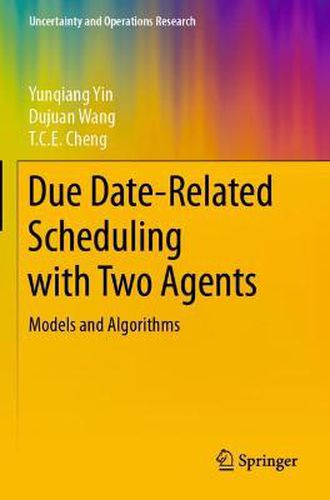Readings Newsletter
Become a Readings Member to make your shopping experience even easier.
Sign in or sign up for free!
You’re not far away from qualifying for FREE standard shipping within Australia
You’ve qualified for FREE standard shipping within Australia
The cart is loading…






This title is printed to order. This book may have been self-published. If so, we cannot guarantee the quality of the content. In the main most books will have gone through the editing process however some may not. We therefore suggest that you be aware of this before ordering this book. If in doubt check either the author or publisher’s details as we are unable to accept any returns unless they are faulty. Please contact us if you have any questions.
This book provides an introduction to the models, methods, and results of some due date-related scheduling problems in the field of multiagent scheduling. In multiagent scheduling, two or more agents share a common processing resource and each agent wants to optimize its own objective function with respect to its own set of jobs. Since the agents have conflicting objective functions, they have to negotiate among themselves with regard to sharing the common resource to optimize their own objective functions. A key feature of due date-related scheduling concerns the way in which due dates are considered: they can be given parameters or decision variables. For the former case, the motivation stems from the need to improve inventory and production management. For the latter case, due date assignment becomes a challenging issue since the decision-maker has to balance inventory holding costs against the benefits of fulfifilling orders in time.
As for due dates, this book addresses the following three different scenarios: (i) The due dates of the jobs from either one or both of the two agents are decision variables, which are determined using some due date assignment models; (ii) The due dates of jobs in each job set are considered as given parameters, whereas which due date corresponds to a given job needs to determine; and (iii) The due date of each job is exogenously given. When the last case is involved, the objective function of each agent is related to the number of just-in-time jobs that are completed exactly on their due dates.
For each considered scenario, depending on the model settings, and on the objective function of each agent, this book addresses the complexity, and the design of efficient exact or approximated algorithms.
This book aims at introducing the author’s research achievements in due date-related scheduling with two agents. It is written for researchers and Ph.D. students working in scheduling theory and other members of scientific community who are interested in recent scheduling models. Our goal is to enable the reader to know about some new achievements on this topic.
$9.00 standard shipping within Australia
FREE standard shipping within Australia for orders over $100.00
Express & International shipping calculated at checkout
This title is printed to order. This book may have been self-published. If so, we cannot guarantee the quality of the content. In the main most books will have gone through the editing process however some may not. We therefore suggest that you be aware of this before ordering this book. If in doubt check either the author or publisher’s details as we are unable to accept any returns unless they are faulty. Please contact us if you have any questions.
This book provides an introduction to the models, methods, and results of some due date-related scheduling problems in the field of multiagent scheduling. In multiagent scheduling, two or more agents share a common processing resource and each agent wants to optimize its own objective function with respect to its own set of jobs. Since the agents have conflicting objective functions, they have to negotiate among themselves with regard to sharing the common resource to optimize their own objective functions. A key feature of due date-related scheduling concerns the way in which due dates are considered: they can be given parameters or decision variables. For the former case, the motivation stems from the need to improve inventory and production management. For the latter case, due date assignment becomes a challenging issue since the decision-maker has to balance inventory holding costs against the benefits of fulfifilling orders in time.
As for due dates, this book addresses the following three different scenarios: (i) The due dates of the jobs from either one or both of the two agents are decision variables, which are determined using some due date assignment models; (ii) The due dates of jobs in each job set are considered as given parameters, whereas which due date corresponds to a given job needs to determine; and (iii) The due date of each job is exogenously given. When the last case is involved, the objective function of each agent is related to the number of just-in-time jobs that are completed exactly on their due dates.
For each considered scenario, depending on the model settings, and on the objective function of each agent, this book addresses the complexity, and the design of efficient exact or approximated algorithms.
This book aims at introducing the author’s research achievements in due date-related scheduling with two agents. It is written for researchers and Ph.D. students working in scheduling theory and other members of scientific community who are interested in recent scheduling models. Our goal is to enable the reader to know about some new achievements on this topic.